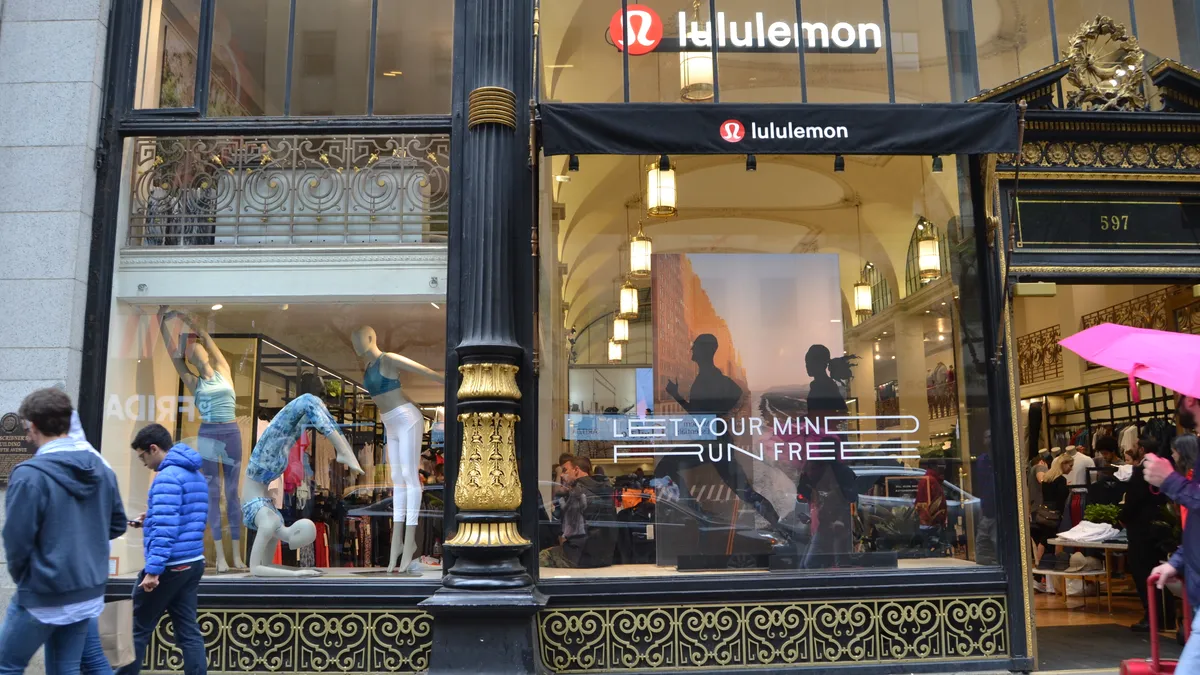Dive Brief:
-
Lululemon on Thursday reported relatively positive results, all things considered. The company posted net income of $29 million, down from $97 million the year prior, and recorded a total revenue decrease of 17%, to $652 million, according to a company press release.
-
After initial closures, Lululemon has reopened around 300 of its stores globally and plans to have nearly all open by the end of June. Current reopenings include about 190 stores in North America, half of its fleet in that region, executives said on a conference call with analysts. Total revenue in Q2 could still decline in the high-single digits, but the retailer is planning on a high-single digit increase in Q4.
-
In the meantime, however, e-commerce has shown strong growth, with digital comps increasing 70%, on top of a 35% increase the year prior. E-commerce made up 54% of total revenue in the quarter, according to a Motley Fool transcript. Those trends are expected to continue, with digital comps increasing 125% in April, and projected to increase the same amount for all of Q2.
Dive Insight:
The message from Lululemon executives coming out of Q1 was much the same as its Q4 report: Stay the course.
The athletics retailer reiterated again that it's Power of Three growth plan was still on, and also that it intended to continue to invest in experiential concepts like its recent Mall of America store, though its mobile and e-commerce site have taken precedence in the short term. CEO Calvin McDonald noted on a call with analysts that these were "very difficult times to evaluate the value of our retail fleet and to make any dramatic shifts," adding that the experiential stores are "just going to be stronger, more powerful locations for us."
As for its core store base, that's also beginning to get back on track. Meghan Frank, senior vice president of financial planning and analysis, noted that stores in China have seen a store comps jump of 20% in recent weeks, and the initial response in North America is "exceeding our expectations." McDonald added that the company is seeing somewhere in the range of 75% to 100% store productivity over last year.
Plans for its paid membership program are also still moving forward and the company will add a new city to the program this year, though the broader launch has been pushed back from early 2021.
To account for its success, executives pointed again to the fact that Lululemon does not rely on seasonal products as much as other sectors of retail, and that the athleisure movement continues to hold strong, especially as consumers work from home. To that end, executives hinted at an expansion of its product offerings to more pant styles aimed at "out of studio use," which should help the retailer extend its influence to other areas of a customer's wardrobe.
To illustrate the brand's strength, McDonald cited NPD data that, in the athletic apparel space, Lululemon saw one of its largest quarterly gains in market share in Q1, despite the pandemic.
"Perhaps better than any other retailer, LULU knows who it is, why it exists, and commits to its purpose," Susquehanna Financial Group analysts led by Sam Poser said in emailed comments. "The company continues to cultivate brand awareness and engage its consumers in an authentic way, which has been, and will continue to be, an extremely powerful draw for the Lululemon brand."
That brand ethos was also reflected in Lululemon's commitment early on to pay its employees during the crisis. McDonald highlighted that the company also paid rent during the period and paid for committed merchandise orders.
"We believe that by supporting our collective and helping them navigate the day-to-day realities of this period, we will build even stronger relationships and increase the already strong loyalty and trust in lululemon," McDonald said.
















